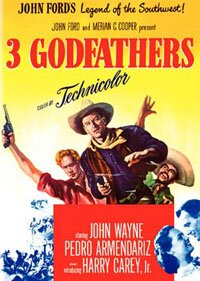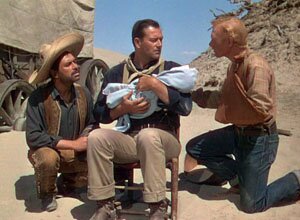Directed by John Ford
 The 1948 John Ford movie 3 Godfathers is, if nothing else, damn odd. And, to be honest, I’d have to say it’s ill-considered. It’s a western as Christmas-tale where three outlaws become something akin to the three wise men of the New Testament, but not really, and in the process reveal themselves as three bad guys who are really, really nice once you get to know them.
The 1948 John Ford movie 3 Godfathers is, if nothing else, damn odd. And, to be honest, I’d have to say it’s ill-considered. It’s a western as Christmas-tale where three outlaws become something akin to the three wise men of the New Testament, but not really, and in the process reveal themselves as three bad guys who are really, really nice once you get to know them.
The film is dedicated to Harry Carey. John Wayne is the star. It co-stars Carey’s son, Harry Carey Jr. (in what I believe to be his first film). It also co-stars Pedro Armendáriz. The three, Wayne, Carey Jr. and Armendáriz, are three outlaws who arrive at the town of Welcome, Arizona, roughly around Christmas time, with the intention of robbing the bank.
When they first arrive they meet a friendly fellow with whom they begin to josh and converse. As the encounter ends, they discover he’s the town’s sheriff (Ward Bond), a man who has a pretty good idea of what kind of men they are and what they’re intentions might be.
So they rob the bank and in short order the sheriff has a posse out after them. Soon, the sheriff realizes that Wayne’s character, Robert Hightower, is a clever man and the chase becomes something of a game for him, the sheriff. It’s a challenge – he looks forward to catching Wayne and playing chess once he’s in prison.
 The chase takes the outlaws out into the desert where they are in search of water and shelter. It’s not easy – one of them is wounded. Each time they come upon water, the sheriff and the posse are there ahead of them so they have to go searching for water elsewhere.
The chase takes the outlaws out into the desert where they are in search of water and shelter. It’s not easy – one of them is wounded. Each time they come upon water, the sheriff and the posse are there ahead of them so they have to go searching for water elsewhere.
So far, so good. It’s an average western – not great, but not bad. But then they come upon a dying woman who is about to give birth. They help her with the birth. The child is born but his mother is dying. Before she does, however, she names the child after the three outlaws, appoints those same outlaws as the child’s godfathers, and makes them promise to care for the child.
The story movie now takes a weird turn where the western continues but a variety of religious elements – symbols and speeches and so on – begin to populate it. (These actually begin back with the woman giving birth to her baby – it is Christmas time.)
The three men care for the child passionately. Two of them perish in the end, for the sake of the child, and the third, Wayne, all but dies. He manages to survive, saving the child, but is caught by the sheriff. He’s taken back to the town of Welcome where he will face trial and a potential sentence of 20 years if found guilty.
The odd thing here (as if things haven’t been peculiar enough) is everyone is friendly, best buds, even though Wayne is in jail and going to court.
As might be expected with a Christmas film (that never really feels like a Christmas film), there is a happy ending to it all.
And it’s all just so damn odd.
On the plus side, however, I think this movie has one of the most interesting performances from John Wayne. He seems more emotive than we usually see him, and there is more animation in his face than usual. He has a nice speech in a scene where he tells the other outlaws about finding a pregnant woman in an abandoned wagon. It’s hard to say whether it’s one of his better performances, though, since the film is so strange. Is he good? Is it over the top? I really don’t know.
I can say this, though: Ward Bond is very good. And so is Harry Carey Jr., especially for a first film. (It’s not his fault the part is written the way it is.)
Also excellent in the film: the cinematography. The shots in the desert are really quite magnificent. The visual look of the movie is very John Ford, very good.
Overall, however, I’d have to say this is a wrong-headed film. It’s the wrong kind of story for John Ford. Apart from being a Christmas western (which just sounds weird), this essentially sentimental, feel-good story is Frank Capra country, not John Ford. Ford doesn’t seem to finesse this kind of story where we can accept the sentimentality – probably because of the western austerity and harshness that plays through most of the film.
Mind you, in its historical context, the Christmas aspect might have played better to an audience of the day than a contemporary one. But for me this is a curious movie but not a particularly good one.
2 stars out of 4.



Go back to ‘piddlin’, cause as a critic, as the Duke might say, it “don’t fit your pistol”. Contrary to your comment this is indeed a John Ford story. Ford was resplendent in his use of an apparently evil lead character finding some sort of redemption. Think of “The Searchers” and you will see what I mean. A Christmas Western is no more weird than a Beverly Hill’s or New York Christmas. People did celebrate in the west albeit perhaps not within your approval rating. The story is basically a classic tale having been filmed numerous times. The symbolism of such things as the Christmas birth, New Jerusalem, 3 ‘wise’ men, the Bible (specially when the wind whips it open to the passage about the donkey and then lo and behold one appears), and finally to the redemption of Wayne’s character as he refuses a parole in return for relinquishing rights to his God-son and then receiving the well wishes of the citizens of Welcome. Just a downright great Christmas film.